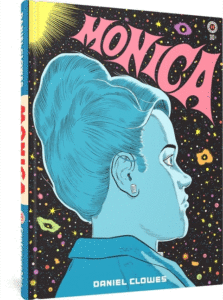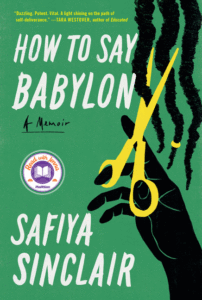
5 Book Reviews You Need to Read This Week
"A hilarious revolt against the aggressive godlessness, dehumanization and fear plaguing our time."
Our quintet of quality reviews this week features Claire Vaye Watkins on Melissa Broder’s Death Valley, Becca Rothfeld on Benjamín Labatut’s The MANIAC, Mark Dery on Daniel Clowes’ Monica, Quiara Alegría Hudes on Safiya Sinclair’s How to Say Babylon, and Lauren LeBlanc on Jonathan Lethem’s Brooklyn Crime Novel.
Brought to you by Book Marks, Lit Hub’s book review aggregator.
*
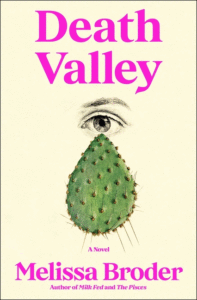
“In her 2021 novel Harrow, the 21st-century monk Joy Williams wrote: ‘I think the world is dying because we were dead to its astonishments pretty much. It’ll be around but it will become less and less until it’s finally compatible with our feelings for it.’ Melissa Broder’s incandescent new novel, Death Valley, is, like her desert forebears, ecstatically awake to the world’s astonishments … Immediately the Mojave starts working its miracles on this sad, horny woman who feels afraid of the sky, judged by the moon and cosmically needy’ … In prose of unparalleled style and seemingly effortless bravery, Broder’s narrator shoots an entire quiver of emotional arrows into herself and then, like Frida Kahlo’s little deer, bounds into the wilderness, heart open, wounds weeping, no hat, not enough water. Despite fearing herself and her novel ‘too earthbound,’ she digs in, getting as earthy as Mary Austin or Ana Mendieta by climbing into a magical Saguaro cactus. Here Broder’s riotously original ecosexual surrealism performs an uncanny transubstantiation, the novel becoming a survival adventure that couldn’t have been better written by Jack London himself. Broder’s euphoric plotting and winning characters combine with a gift for desert description (that pink light creeping out into infinity) reminiscent of Willa Cather’s Death Comes for the Archbishop. I tried to ration this book but guzzled … If we can learn, as Broder all but implores, to worship a land that would impale the sentimental, leaf-stroking impulse of the pastoral, then maybe we can love the whole world as it deserves to be loved. Given that the protagonist meets God in the Mojave, what to make of the fact that many of the places that awaken us to the world’s astonishments are slated for sacrifice? … Death Valley is a triumph, a ribald prayer for sensuality and grace in the face of profound loss, a hilarious revolt against the aggressive godlessness, dehumanization and fear plaguing our time.”
–Claire Vaye Watkins on Melissa Broder’s Death Valley (The New York Times Book Review)
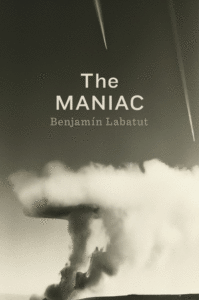
“…the geniuses who fascinate the Chilean author Benjamín Labatut dream of abdicating their personhood to become gods and machines … Is The MANIAC a work of fiction? Or do we call it fiction because we lack a better word for its creative conquest of fact? Most critics tasked with rendering Labatut recognizable liken him to the melancholic German writer W.G. Sebald, whose gently meandering novels contain long, dreamy meditations on destruction and decay. It is true that both authors toe the wavering line between invention and history, drawing on a wealth of historical and scientific details, but Labatut is that vanishingly uncommon thing: a contemporary writer of thrilling originality…The MANIAC is a work of dark, eerie and singular beauty. It can also be difficult to read. The book is narrated by a cluttered polyphony of characters, among them both of von Neumann’s wives and a number of his teachers and colleagues. But there is a reason for this mad mumble of voices … Like von Neumann, The MANIAC strives to adopt the impartial standpoint of the universe … Labatut’s characters are all agonizingly human in one respect, no matter how hard they are trying to become machines: They care immensely. They are desperate to get to the bottom of things, all the way to the entrails of reality … It is dangerous for a mortal to approach the mind of God, and it is no surprise that everyone in Labatut’s fiction is always going mad, even the figures mentioned only in passing … The worst part of these dark tales, though, is not that reason revolts when it is pressed too far but that the world turns out to be disordered, down to its very seams…Tumult is not an affront to human reason but its logical culmination. The only way to transcend confusion is to transcend human cognition itself.”
–Becca Rothfeld on Benjamín Labatut’s The MANIAC (The Washington Post)
“In Monica, his trademark cynicism about the Lynchian depravity behind the salesman’s smarm and self-help platitudes of American life has shifted into a more pensive, philosophical key. Clowes is resolutely the atheist he always was, but Monica reveals his Gen-X cynicism as the zeitgeist-y side of a deeper disquiet … In Monica’s cover story, a mystery about a woman desperate to unriddle the miseries of her childhood, Clowes confronts—with his usual black-comedic wit—questions usually reserved for religion. He wrestles with the complications of life after death (what do you do when grandad reveals himself, from beyond the grave, as an anti-Semite?); unearths the historical roots of Gen-X angst and anomie, which for Clowes are the psychic scum left by the receding wave of the counterculture; ponders the perils (and seductions) of blind faith; and takes the full, painful measure of the persistence of memory that makes us prisoners of our pasts … Of course, Clowes being Clowes, we’re nagged by the suspicion that we’re meant to read the story at an ironic remove, as creepy yet campy—a suspicion reinforced by his visual rhetoric. Densely referential, polyvalent, and—a word that’s now officially cringeworthy, but was all the rage in Eightball’s heyday—postmodern in its knowing use of genre tropes and signature styles, Clowes’s work is always in dialogue with the comics medium. In Monica, he walks the line between homage and parody, appropriating—and interrogating—the comic books and Sunday funnies he grew up with.”
–Mark Dery on Daniel Clowes’ Monica (4Columns)
“Sinclair’s breathless, scorching memoir of a girlhood spent becoming the perfect Rasta daughter and an adolescence spent becoming one of Jamaica’s most promising young poets. For its sheer lusciousness of prose, the book’s a banquet. Sinclair’s Montego Bay drips with tender sensuality and complexity that seduces you like a fresh wound to slow pokes and feels … A gripping tale of fundamentalism and the light of rebellion piercing through its cracks. Critiques of colonial and patriarchal violence weave throughout, made all the more scathing by Sinclair’s patient understatement. At the book’s core, though, is a personal tale of two artists separated by a chasm … While the memoir’s conclusion explodes with urgency, it lacks Sinclair’s slow-brewed sagacity. History catches up with her, and not enough years have passed for wisdom to surface. I was startled by the finale — was all her searing testimony in service of Djani’s redemption? I had to put the book down, walk away. With a bit of distance, I came to feel that the center of this book was its matriarch. Despite her obedient silences, her rare and shocking betrayals of Sinclair’s safety, Esther quietly instigates tectonic shifts in her children’s lives. Her motherly accomplishments are impressive, but it’s her decisive redirection of her own path that illuminates the long arc of self-liberation.”
–Quiara Alegría Hudes on Safiya Sinclair’s How to Say Babylon (The New York Ties Book Review)
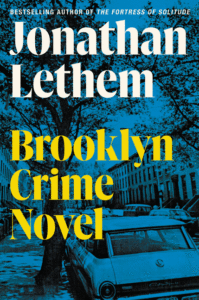
“Explores familiar territory from a new point of view in a style new to him. It unfolds through passages ranging in length from less than a page to a dozen, each labeled and dated. And it leaps between decades and then into liminal spaces that exist across time to cast a light on forgotten exchanges and actions. This kaleidoscopic, fragmentary quality is no lark; it is essential to Lethem’s project … At first glance, the book’s stark title — coupled with Lethem’s frequent play with mystery tropes—signals that this is a genre novel. It is definitely not … A brutal question to ask yourself: Was writing a book about your childhood friends and home turf an act of betrayal? … Lethem lets the ragged edges remain visible. The story’s texture and pacing echoes his message … The novel is also an endless declaration of love. Every neighborhood deserves such a discursive portrait, such ruthless devotion and such an audacious book.”
–Lauren LeBlanc on Jonathan Lethem’s Brooklyn Crime Novel (The Los Angeles Times)
Book Marks
Visit Book Marks, Lit Hub's home for book reviews, at https://bookmarks.reviews/ or on social media at @bookmarksreads.










